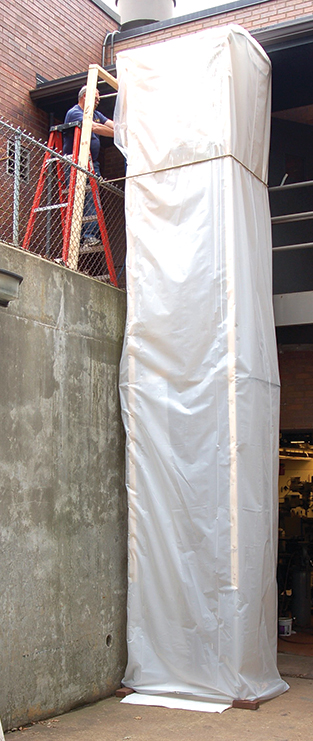
Dry Fall Properties of Protective Coatings
A new ASTM International standard will be used to substantiate manufacturers' claims on the inherent dry fall characteristics of coating materials such as paint. D7868, Practice for Determining the Dry Fall (Fog) Properties of Protective Coatings, was developed by Subcommittee D01.46 on Industrial Protective Coatings, part of ASTM International Committee D01 on Paint and Related Coatings, Materials and Applications.
According to Bill Corbett, vice president, KTA-Tator Inc., dry fall coatings have been available for decades and are produced and sold by coating manufacturers throughout the world. Dry fall coatings are formulated so that overspray particles dry as they move through the air before landing on horizontal surfaces. Particles can then be brushed off, vacuumed or washed from surfaces with no damage.
"The inherent dry fall characteristics of these coating materials are critical in avoiding damage to property adjacent to and below spraying operations," says Corbett. "However, there was no known standardized testing procedure to substantiate manufacturers' claims regarding dry fall properties."
D7868 was developed to qualitatively evaluate the dry fall properties of coatings prior to use on painting projects in which overspray cannot be tolerated. In addition, the new practice will be used to evaluate whether coatings demonstrate the same dry fall properties when the fallout collects on surfaces having an elevated temperature, such as cars parked in sunlight.
To purchase ASTM standards, visit www.astm.org and search by the standard designation, or contact ASTM Sales (phone: 877-909-ASTM; sales@astm.org).
CONTACT Technical Information: Bill Corbett, KTA-Tator Inc. • Pittsburgh, Pa. • Phone: 412-412-1300, ext. 223 | ASTM Staff: Jeffrey Adkins • Phone: 610-832-9738 | Upcoming Meeting: Jan. 26-28, 2014 • January Committee Week • Houston, Texas
 SN Home
SN Home Archive
Archive Advertisers
Advertisers Masthead
Masthead RateCard
RateCard Subscribe
Subscribe Email Editor
Email Editor